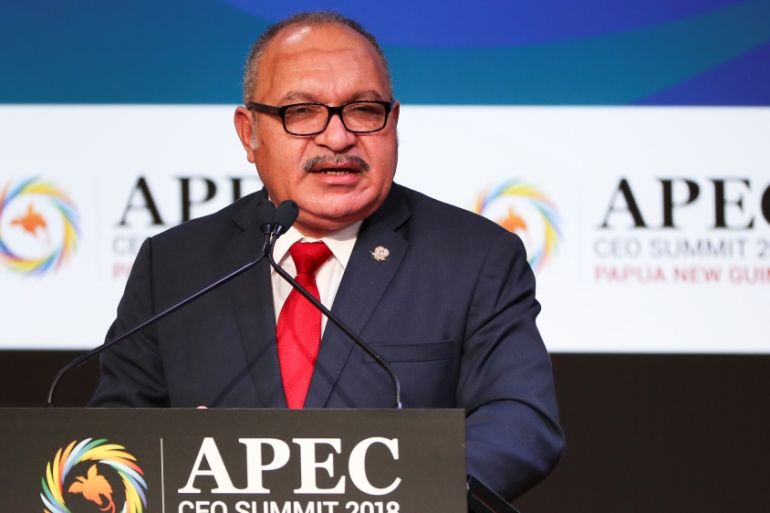Papua New Guinea police seek to arrest ex-PM over ‘corruption’
Arrest warrant issued for former Prime Minister Peter O’Neill, but he is refusing to cooperate, police say.

Papua New Guinea (PNG) police have issued an arrest warrant for former Prime Minister Peter O’Neill on suspicion of “official corruption” but he was refusing to cooperate, authorities said.
The warrant, issued last Friday, stemmed from an investigation, however, police gave no details of what O’Neill was wanted for, citing the sensitivity of the investigations.
Keep reading
list of 4 itemsA year since Pakistan’s May 9 riots: A timeline of political upheaval
Fiji’s former Prime Minister Frank Bainimarama jailed for a year
Candidates confront corruption and inequality in Panama’s presidential race
“The warrant was obtained upon the weight of the evidence brought forward by the investigators,” David Manning, the acting police commissioner, said in a statement on Tuesday.
O’Neill quit as prime minister in May after seven years in the top job amid a wave of discontent over a perceived lack of public financial benefit from major resource projects and complaints about corruption, which he denied.
A senior police official asked O’Neill, who was at the Crowne Plaza hotel in the PNG capital of Port Moresby on Tuesday morning, to accompany him to a police station to be processed.
“As we speak, he has refused to cooperate with police thus far,” Manning said in the statement, urging O’Neill to make himself available to investigators.
But the Australian Broadcasting Corporation reported from Port Moresby that O’Neill said he was cooperating with police and looked forward to proving his innocence in court.
‘False and fabricated’
In a statement, O’Neill described the charges as a “political move” with “false and fabricated” charges and claimed he was “not informed or presented with a warrant to appear anywhere today”.
“If this was a serious matter, not a political power play, a formal process would be in place that would have seen legal representation made to my office.”
He warned any police officer trying to execute the warrant to “think carefully” before following the orders of his long-time critic, Minister for Police Bryan Kramer.
O’Neill’s long tenure was marked by a string of corruption allegations, including the purchase of 40 Maseratis for an Asia-Pacific leaders summit he hosted – in a country where few homes have reliable electricity.
He was forced to step down after allies baulked at his decision to sign a multibillion-dollar liquefied natural gas deal with France’s Total and US firm ExxonMobil.
Local communities had complained bitterly about not benefitting from similar deals in the past.
After promising to resign and then trying to remain in power via the courts, he was ultimately replaced by his former Minister of Finance James Marape, who vowed to clean up the government.